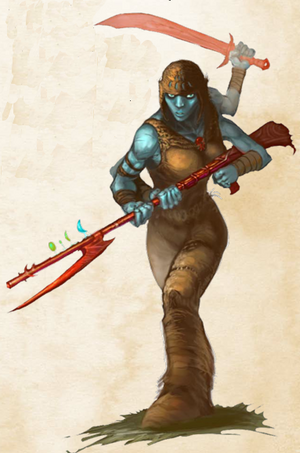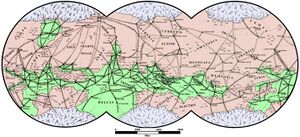Mars: Difference between revisions
1d4chan>Gilten (A little topquote) |
No edit summary |
||
| Line 8: | Line 8: | ||
In the backstory of [[Warhammer 40,000]], the [[God-Emperor of Mankind]] imprisoned the full, unsharded [[Void Dragon]] on Mars during the Middle Ages, knowing that he would need it later. Presumably it amused [[Troll|itself]] by blowing up space probes during M2. | In the backstory of [[Warhammer 40,000]], the [[God-Emperor of Mankind]] imprisoned the full, unsharded [[Void Dragon]] on Mars during the Middle Ages, knowing that he would need it later. Presumably it amused [[Troll|itself]] by blowing up space probes during M2. | ||
Mars turned out to be one of the first worlds colonized by [[humanity]]. The colonization and terraforming were backed by industrial cartels, and carried out by their employees. Obsessed with technology and knowledge, its inhabitants upgraded themselves and their planet in every conceivable way. Mars became encrusted with buildings, factories, and laboratories, a sort of hybrid [[Hive World| Hive]] and [[Forge World]] (the first of many to come). It was independent of [[Earth]], which meant that they rode out the Age of Strife more or less intact, although their world had deteriorated somewhat due to the lack of an environmental protection policy. | Mars turned out to be one of the first worlds colonized by [[humanity]] because no shit Sherlock it's right fucking there.. The colonization and terraforming were backed by industrial cartels, and carried out by their employees. Obsessed with technology and knowledge, its inhabitants upgraded themselves and their planet in every conceivable way. Mars became encrusted with buildings, factories, and laboratories, a sort of hybrid [[Hive World| Hive]] and [[Forge World]] (the first of many to come). It was independent of [[Earth]], which meant that they rode out the Age of Strife more or less intact, although their world had deteriorated somewhat due to the lack of an environmental protection policy. | ||
To elaborate on that, with the Age of Strife, Mars could no longer import what it needed to maintain its artificially-maintained terraforming (Mars being too small for it to stick). The only groups that survived were those that hoarded enough know-how to build environmentally sealed facilities that could keep air in and mutants out. This led to their tech-obsession becoming fanatical, and their disregard for anything but machinery made sure that the environment would never recover. | To elaborate on that, with the Age of Strife, Mars could no longer import what it needed to maintain its artificially-maintained terraforming (Mars being too small for it to stick). The only groups that survived were those that hoarded enough know-how to build environmentally sealed facilities that could keep air in and mutants out. This led to their tech-obsession becoming fanatical, and their disregard for anything but machinery made sure that the environment would never recover. | ||
Revision as of 22:24, 12 January 2019

"I would like to die on Mars. Just not on impact."
Mars is the fourth planet in our solar system. It has a long history of fictitious inhabitants, and its proximity to Earth makes it a popular target for colonization. It has a tendency for probes sent to it to meet bad ends.
Warhammer 40,000
In the backstory of Warhammer 40,000, the God-Emperor of Mankind imprisoned the full, unsharded Void Dragon on Mars during the Middle Ages, knowing that he would need it later. Presumably it amused itself by blowing up space probes during M2.
Mars turned out to be one of the first worlds colonized by humanity because no shit Sherlock it's right fucking there.. The colonization and terraforming were backed by industrial cartels, and carried out by their employees. Obsessed with technology and knowledge, its inhabitants upgraded themselves and their planet in every conceivable way. Mars became encrusted with buildings, factories, and laboratories, a sort of hybrid Hive and Forge World (the first of many to come). It was independent of Earth, which meant that they rode out the Age of Strife more or less intact, although their world had deteriorated somewhat due to the lack of an environmental protection policy.
To elaborate on that, with the Age of Strife, Mars could no longer import what it needed to maintain its artificially-maintained terraforming (Mars being too small for it to stick). The only groups that survived were those that hoarded enough know-how to build environmentally sealed facilities that could keep air in and mutants out. This led to their tech-obsession becoming fanatical, and their disregard for anything but machinery made sure that the environment would never recover.
Their culture had changed as well; with so much knowledge lost during the dark times (and with some influence from that shard of the Dragon), the people of Mars had dedicated themselves to preserving what information they could, and they did this with a religious fervor, coming to be known as the Mechanicum (and even later, reformed as the Adeptus Mechanicus).
The God-Emperor of Mankind won them over to his side for the Great Crusade by pwning their expeditionary fleet they sent to raid Terra for STC printouts (the only remaining knowledge from the Dark Age of Technology), and then promptly promising them first dibs on any terran STC printouts, and the new ones that would be discovered by his Space Marine Legions, and they provided power armor and bolters for his growing armies. Just As Planned.
Unfortunately, there was tension within the ranks of the tech-priests, and Horus was able to play on this (with a little help from Chaos) and sow a civil war as part of the Horus Heresy. Terrible weapons were unleashed, from the mighty Titan legions to bizarre techno-organic creatures, and Mars was left even more damaged than before.
The present-day Mars is more or less recovered, though it would never attain the greatness it had before the Horus Heresy. Much of the planet is barely-inhabitable wasteland dotted with forges and hives, where stored knowledge is fragmented at best, and subverted by Chaos or Necrons at worst. Though the new Adeptus Mechanicus is essentially a superstitious priesthood, they retain most of the Imperium's technical knowledge and best technologies; and Mars is still the seat of one of the most powerful Imperial institutions and is among the top percentile of the most productive forge worlds, if not the top forge world.
Pathfinder


From the Pathfinder Roleplaying Game's Campaign Setting, Golarion, we have Akiton. A typical Mars expy, made of vast red plains of iron-rich sand and stone with two polar icecaps, it's largely inspired by Science Fantasy tales from the early 20th Century; Most notably the Barsoom series by Edgar Rice Burroughs. It has low gravity, a thin but breathable atmosphere and is inhabited by human-like red skinned natives; 12-foot tall, four-armed grey skinned Shobhads whose tribes are constantly a war with each other; ratmen, red-skinned lizardmen and finally, the bizarre Contemplatives of Ashok, who are giant floating brains with crude, thin bodies hanging almost uselessly underneath. Behirs, like on Golarion, can be found along with Death Worms, Elder Things (Usually hibernating in either of the Poles), Denizens of Lang (Who can be found pretty much everywhere else too), Girallons (Giant four-armed apes, also from the Barsoom series), Shoggoths (Usually in the South Pole) and Witch-Wyrds.
The Campaign Setting book "Distant Worlds" deals with Golarion's solar system and its planets.
Space: 1889

In Space: 1889, a Victorian sci-fi (not steampunk) setting, Mars was the go-to place for exploiting the natives and natural resources. Why deal with human-rights issues in India when you can exploit the non-humans of Mars instead? Mars is also the source of liftwood, used for crafting the hulls of gravity-resistant skygalleons, and useful for aetheric vessels between planets.